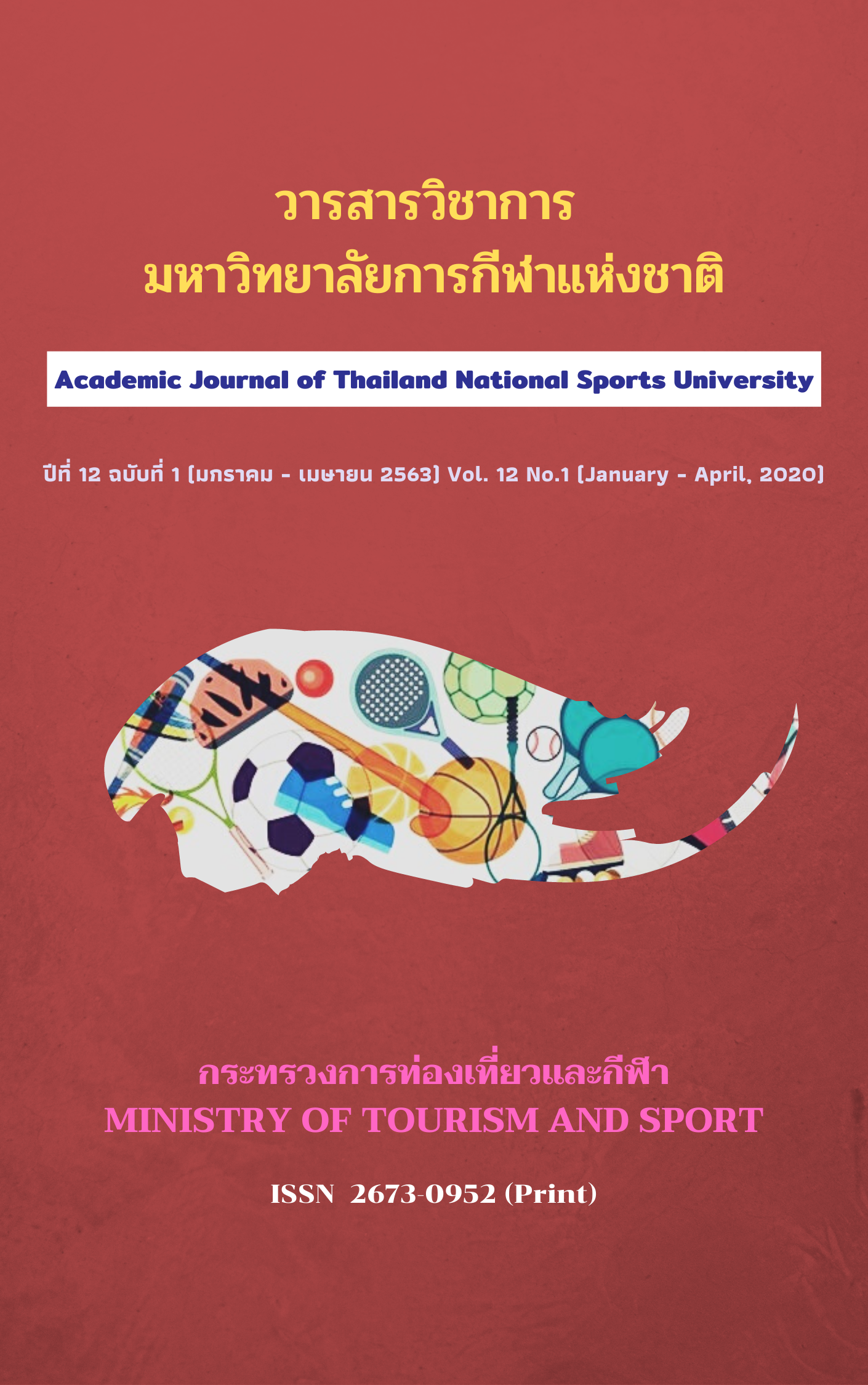THE DEVELOPMENT OF LEARNING ACTIVITY USING COMMUNITY BASED INSTRUCTION TO PROMOTE HEALTH BEHAVIORS IN ACCORDANCE WITH THAI WISDOM
Main Article Content
Abstract
The purposes of this research were to develop a learning activity package based on the local wisdom in the community; to study the health behaviors of the students through the learning activity package based on the local wisdom in the community; to study the students’ satisfaction towards the use of learning activity package developed based on local in the wisdom community. The samples in this study were 32 lower secondary school students who participated in the 2nd semester of the academic year 2017. Purposive selection was used to identify the participants in this study. The school is under Secondary Education Service Area 10, Ministry of Education, The research design was the one group pretest-posttest design. The research tools consisted of the learning activities based on local wisdom community, lesson plans, an achievement test, and a questionnaire students’ satisfaction towards the learning based on the local wisdom in the community. The data was analyzed using the mean score of the pre-post-test
The results revealed that the researcher developed a set of learning activities based on the community concept as a base with the Thai wisdom created by the researcher, consisting of 1)Activity name 2)Preface 3)Statement for teachers 4)Statement for students 5)Essence / Purpose 6)Knowledge sheet/activity sheet 7)Test form 8)Learning plan. The result of health behavior in the knowledge after learning revealed the mean scores of the sample in the post-test was 23.6, whereas the mean scores on the pre-test was 15.4. the result of health behavior in the attitude after learning revealed the mean scores of the sample in the post-test were 74.5, the mean score on the pre-test was 46.2 at the 0.01 level and the result of health behavior in the practical action after learning revealed the mean scores on the post-test was 42.1, whereas the mean scores on the pre-test was 23.4 at the 0.01 level. In addition, the results of the study in term of promoting health behavior showed that significant differences were found between pretest and post-test at the 0.01 level. The concept of learning communities as a base in terms of structure and content can be useful in teaching properly. The necessary requirements to reinforce healthy behaviors with Thai wisdom concepts covered community-based ideas, beliefs in the different cultures, and Living together. These can create the proper attitudes and the appropriate way in order to live together.Understanding the proper implementation of the resources was available locally for maximum benefit. It was also the cornerstone of the working class and the lives of the students. The community can coexist happily in a systematic way. The implementation phase of the system-oriented approach involved educational policies of the Core Curriculum for Basic Education Curriculum in Health and Physical Education. To increase activity, reduce the time to analyze the concepts and theories related research and development activities were based on the concept of learning communities as a base, according to organized learning activities with the participation of the community.
Article Details
The published article is a copyright of the Academic Journal of Thailand National Sports University. The passage appeared in each article in this academic journal is a perspective of each author which is not related to the journal. Each author is required to be responsible for all components of his/her own article. If there are any mistakes, each author must be responsible for those mistakes on his/her own.
References
Academic and Education Standard Office. (2010). Learning Activity Management Trend as Basic Education for Curriculum B.E. 2551 (A.D.2008). Bangkok: The Printer of Agriculture Co-Operative Federation of Thailand, Ltd.
Academic and Education Standard Office. (2016). Timing Management Manual. Moderate Class, More Knowledge.
Davis, G.A., and Thomas, M.A. (1989). Effetive Schools and Effective Teachers. Boston: Allyn and Bacon.
Joyce, B, & Weil, M. (1996). Model of Teaching (5th ed.). Boston: Allyn and Bacon.
Niwat Boonsom. (2013). Instructional Model Development as problems solving creatively for innovation support with student’s health with the science gifted. (Doctoral dissertation). Graduated school. Silaphakorn University.
Patchara Phumphachat. (2013). Experienced management and problems solving creatively development for early childhood. (Doctoral dissertation). Silaphakorn University.
Patcharee Srisung. (2008). Social psychology learning model development by using community and experienced based for qualification of desirable bandit promotion. Bangkok: Research (Research and Curriculum Development), Nakhonpathom.
Sumon Amorwiwat. (2001). Learning Process from Learning Resources in Community and natural. Bangkok: The Committee of National Education office.
The Committee of Basic Educational Office, Secondary Management Office. (2015). Analysis report of the nucleic heartily seminar. The Condition and the Muffler of Basic Education Core Curriculum B.E 2551 (A.D.2008).
Tissana Khemmanee. (2009). Learning Management by Research as a Part of Learning Process, Trend, Principle and Methods. Bangkok: Ladprao Kurusapha Printer.


